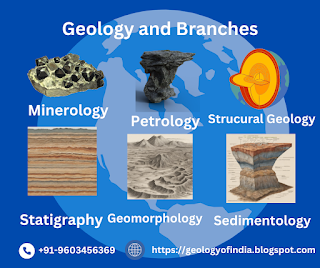Geology and Some of the Main Branches including Definition of Geology and Brief Introduction: Geology is the study of the Earth, its structure, composition, processes, and history.
It encompasses the investigation of various aspects of the Earth, including its rocks, minerals, land forms, and the processes that have shaped and continue to shape the planet.
Geologists seek to understand the Earth's history, the forces that have shaped its surface, and the materials that make up the planet.
The field of geology is quite broad, and it can be divided into several branches or subdisciplines, each focusing on specific aspects of the Earth. Some of the main branches of geology are:
1. Physical Geology: This branch deals with the study of Earth's materials, including minerals and rocks, and the processes that shape the Earth's surface. It involves examining the Earth's internal structure and the forces responsible for geological phenomena like earthquakes, volcanoes, and plate tectonics.
2. Mineralogy: Mineralogy is the study of minerals, which are the building blocks of rocks. Mineralogists analyze the composition, structure, and properties of minerals.
3. Petrology: Petrology is the study of rocks, including their origin, classification, and the processes that lead to their formation. It is divided into three main subdisciplines: igneous petrology, sedimentary petrology, and metamorphic petrology.
4. Structural Geology: Structural geology focuses on the deformation and arrangement of rocks in the Earth's crust. It involves the study of geological structures like faults, folds, and rock layers.
5. Stratigraphy: Stratigraphy involves the study of rock layers, or strata, and their chronological arrangement. It is used to establish the relative ages of rocks and the history of Earth's surface.
6. Geomorphology: Geomorphology explores the landforms and surface features of the Earth, including mountains, valleys, river systems, and coastal areas. It examines the processes responsible for shaping the landscape.
7. Sedimentology: Sedimentology is the study of sediments and sedimentary rocks. It investigates how sediments are transported, deposited, and eventually become rocks.
8. Geophysics: Geophysics uses principles of physics to study the Earth's internal structure and its physical properties. Techniques like seismology and gravity surveys are used to investigate subsurface features.
9. Geochemistry: Geochemistry is the study of the chemical composition and behavior of Earth materials. It plays a crucial role in understanding the Earth's evolution and processes, such as the rock cycle and the formation of minerals.
10. Hydrogeology: Hydrogeology focuses on the distribution and movement of groundwater in the Earth's subsurface. It is important for issues related to water resources and environmental contamination.
11. Environmental Geology: Environmental geology addresses the interaction between human activities and the Earth, particularly concerning issues like pollution, natural hazards, and land use planning.
12. Planetary Geology: Planetary geology is the study of the geology of other celestial bodies, such as the Moon, Mars, and asteroids. It helps us better understand the geological history of these objects.
These branches of geology are interconnected, and geologists often work across multiple disciplines to gain a comprehensive understanding of the Earth's processes and history. Geology is a dynamic field that contributes to our knowledge of the Earth and has practical applications in areas like resource exploration, environmental protection, and hazard assessment.
Frequently Asked Questions
What is geology and geologists work?
Geology is the study of the Earth, its materials, processes, and the history of its development. Geologists investigate and analyze rocks, minerals, and natural processes to understand the Earth's structure and history
What are the different branches of geology?
Geology has several branches, including: Environmental Geology: Focuses on the interaction between humans and the Earth's environment. Mineralogy: Studies minerals and their properties. Paleontology: Examines fossils to understand past life forms. Volcanology: Studies volcanoes and volcanic phenomena. Hydrogeology: Focuses on groundwater and water resources Google Search Engine
Visit Official Home Page







0 Comments